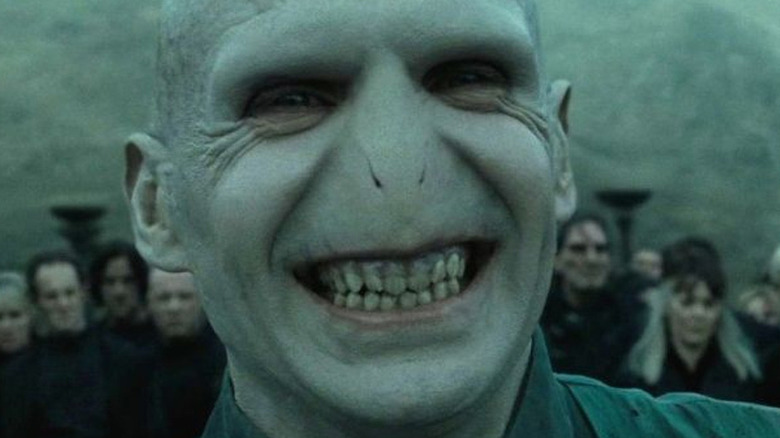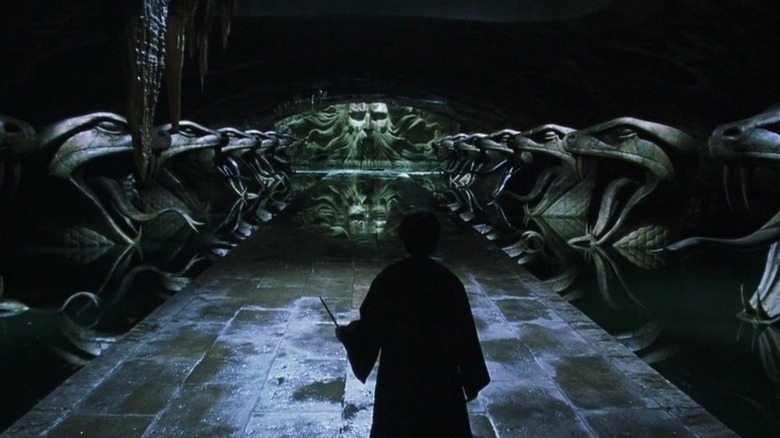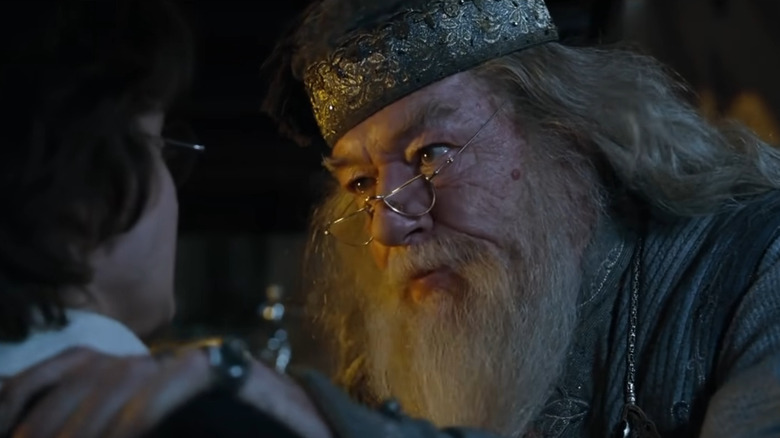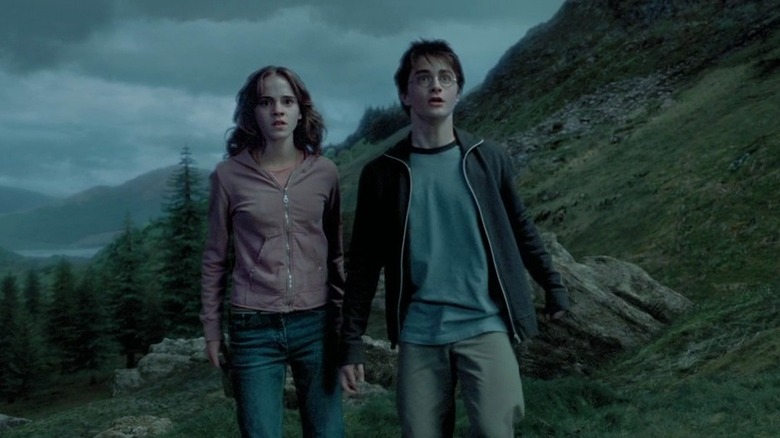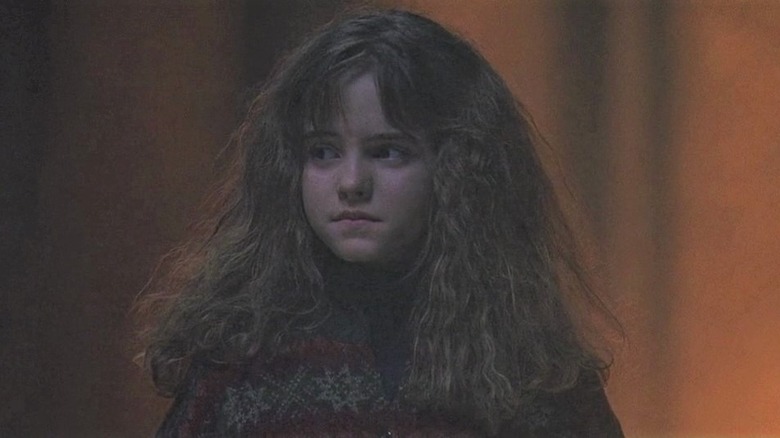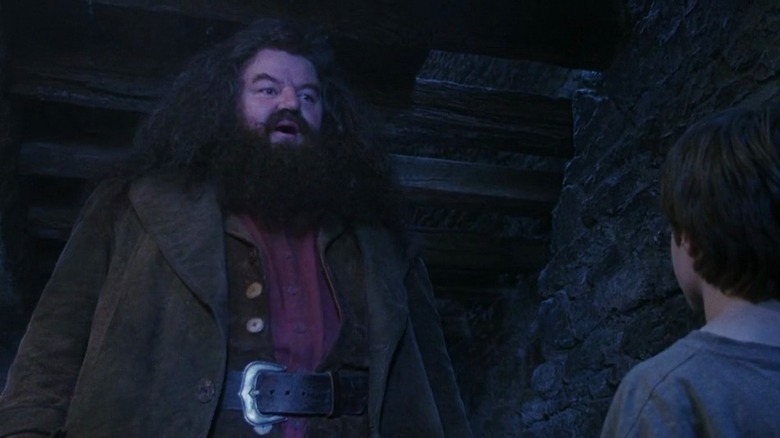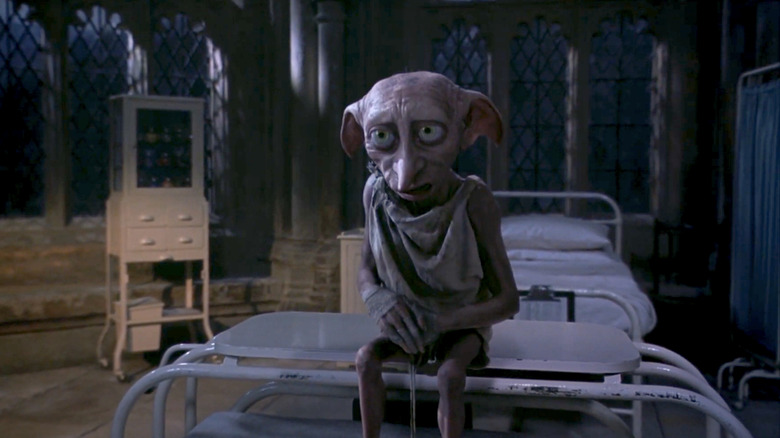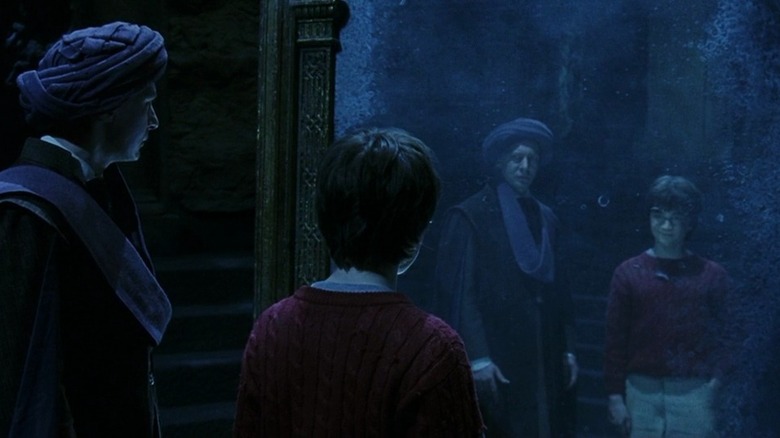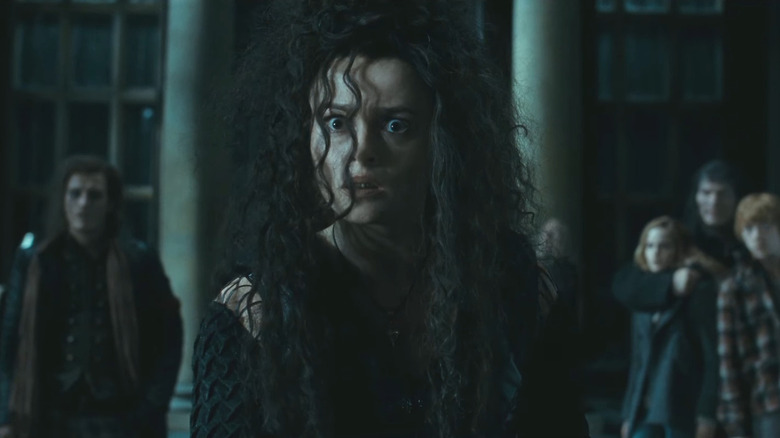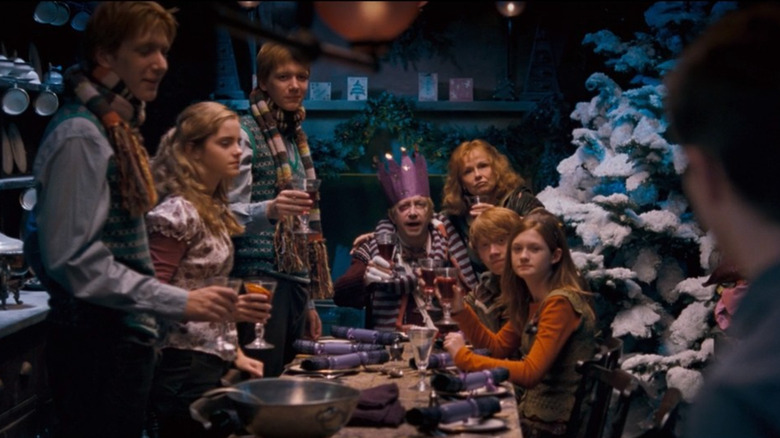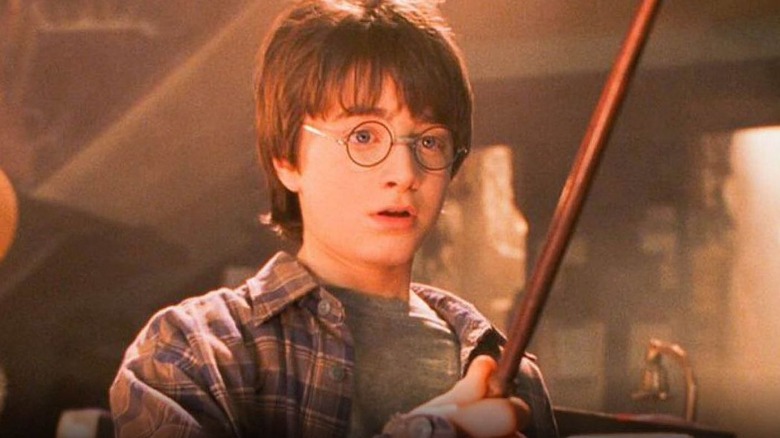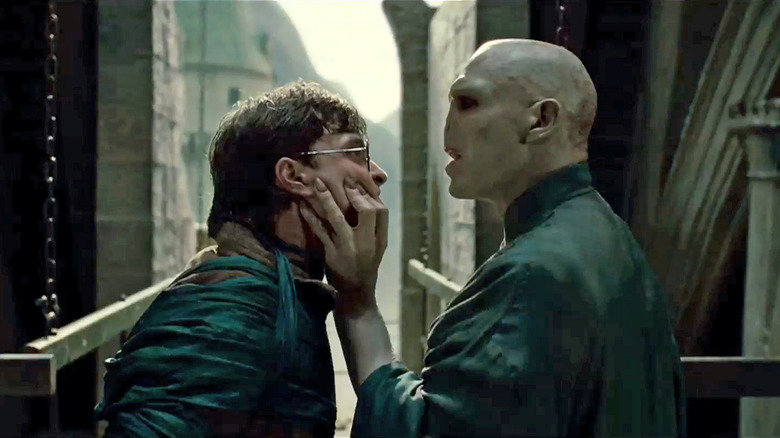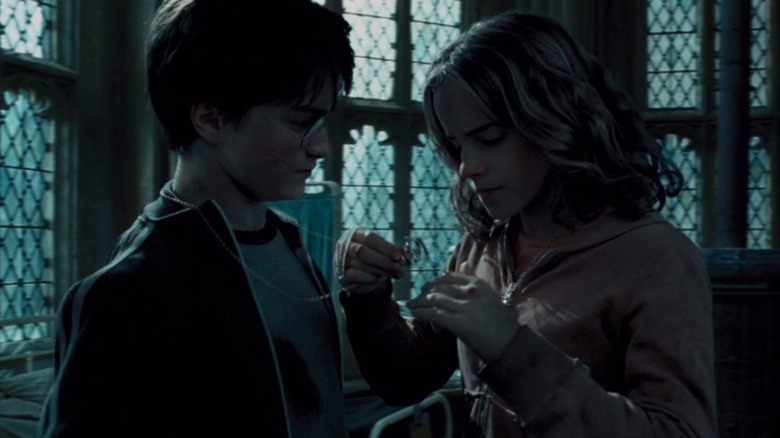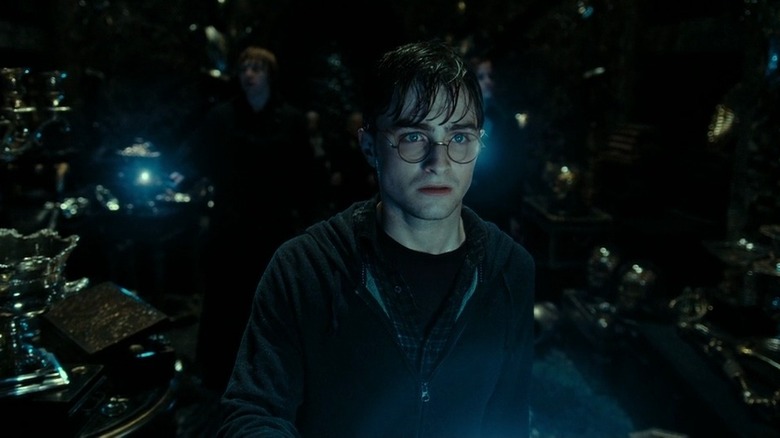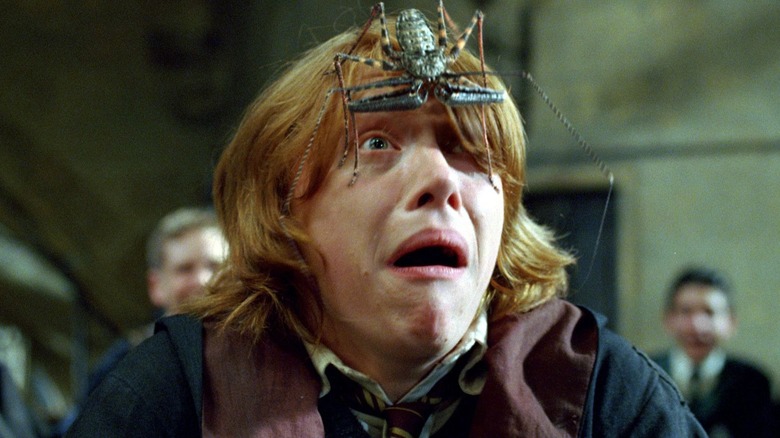The Best And Worst Things From The Harry Potter Franchise
Following the breakout success of J.K. Rowling's "Harry Potter" novels, Hollywood soon came calling. Much like the source material they were based on, the Warner Bros. movies about a young wizard named Harry and his adventures at Hogwarts School of Witchcraft and Wizardry enjoyed unprecedented financial success. Of course, no film is perfect, even in a franchise as magical as "Harry Potter."
The "Harry Potter" fandom is a large and thriving one, and the internet is filled with fans who still regularly debate the merits of the movies with each other according to their personal preferences. Over the years, some aspects of the films have been praised by fans and critics, while other aspects have been understandably judged wanting. From powerful themes to problematic storylines, let's take a look at some of the things the "Harry Potter" films did right, and some of the things that they got very wrong.
Best: Amazing world-building
The main strength of the "Harry Potter" series, both in book and movie form, has always been the secret world of magic that its titular character enters and explores along with the audience.
Harry starts out as an ordinary 11 year old who is one day invited to study at a magical school called Hogwarts. At this fantastical academy, audiences learn of an amazing world where magicians live alongside strange and terrifying creatures mined from mythology and classic fantasy. You see a stone that can grant you eternal life, a giant snake that can kill you with its gaze, foul beings that can suck out your soul, and a wide host of incredible creatures and backgrounds. What's even better is that these details form an essential part of the plot instead of being narrative window dressing.
The "Harry Potter" franchise masterfully sucks you into this bewildering, bewitching world where broomsticks can be used to fly and a book can try to bite your fingers off. At the heart of the whole saga is Hogwarts, possibly the coolest school in all of fiction, regardless of how frankly dangerous the place is for its students and teachers.
Worst: Bad acting
The various filmmakers who directed "Harry Potter" had different takes on how faithful to stay to the books and how childish or grown-up the movies needed to be for their target audience. One noticeable way this affected the movies is in the wildly varying quality of acting.
While the films are filled with veteran actors, the majority of the focus is on its child actors who were learning the ins and outs of the profession at the time. The child actors don't always do the best job of playing their roles, which is something they've admitted themselves. For example, take Daniel Radcliffe, who has gone on record saying that he feels he was "not very good" in the titular role of Harry Potter in many of the films.
But it's not just the children who are to blame. A lot of the fault also lies with the adult actors, who often can't seem to decide whether they're supposed to act in a serious or over-the-top manner. Case in point, Michael Gambon's way-too-enthusiastic and angry reading of the line "Harry, did you put your name in the Goblet of Fire?" that has been parodied and mocked endlessly on the internet.
Best: Powerful themes
Children's cinema often falls into one of two categories. Either the film has no great theme or lesson beyond keeping its young audience entertained, or the theme is rammed down the throat of its audience with the subtlety of a sledgehammer. The "Harry Potter" series walks the fine line of having many themes without them overwhelming the narrative.
The first and most important theme the series deals with is the power of love in all its forms. When we initially meet Harry, he has no parents or friends, and he's roundly hated by his extended family. But then he discovers a new home at Hogwarts, and what makes the place seem like a safe haven is the many friends he meets there who come to love him fully and unconditionally.
Apart from the power of love, the "Harry Potter" movies also make thoughtful observations on a variety of themes, such as the importance of authority but also knowing when to break the rules, how loyalty and kindness can even turn enemies into allies, and the importance of putting the needs of the many ahead of the needs of the few — or in Harry's case, his own self.
Worst: Cutting important plot points
The "Harry Potter" books are long by the standards of children's novels, and they grow longer as the series reaches its epic conclusion. As a result, the makers of the "Harry Potter" movies were faced with the difficult task of adapting the novels into features that would run for less than three hours, and they managed to stick to that rule for the most part.
Unfortunately, a major issue with this approach is that many important plot points from the books completely vanish from the movies or are shown in a highly shortened state. For example, the character of Peeves the Poltergeist from the books never shows up in the movies, or a scene at the end of the "Sorcerer's Stone" novel showcasing Hermione's brilliance when confronted with a riddle regarding potions was cut from the movie.
The result of this approach is that you sometimes feel while watching the movies that you are watching a "CliffsNotes" version of the "Harry Potter" books rather than a proper adaptation. Characters are less defined, the circumstances are not explained as thoroughly, and the focus is more on the CGI spectacle side of the magical world of Hogwarts rather than the complex characters and circumstances that make the books so memorable.
Best: Memorable characters
All the world-building and imagination a story provides would be of little use if it isn't in service of characters that audiences can connect with. Fortunately, the "Harry Potter" films do not suffer from this problem as they draw faithfully from the novels when it comes to populating the main cast of characters with interesting personalities.
The movies hit the ground running by starting with the introduction of Albus Dumbledore, an elderly man with twinkling eyes who nevertheless gives off an aura of immense power and mystery. We then get to meet the sharp-tongued Minerva McGonagall, the kind-hearted half-giant Rubeus Hagrid, and the dreadful Dursleys whom Harry lives with for the first 10 years of his life. Then its on to Hogwarts to meet a fresh roster of students, teachers, ghosts, and villains.
All these characters, whether you love them or hate them, are eminently memorable. The trend continues in later parts of the franchise with characters who are not simply cardboard cutouts spouting exposition but who feel like real flesh-and-blood people with their own strengths and frailties. This kind of character work is rare in children's cinema, as is the inclusion of someone like Severus Snape, easily one of the most complicated characters in all of fiction.
Worst: Problematic plot points
Every story ever told is very much a product of its time. This does not have to be a bad thing since the story can serve as a snapshot for future audiences. The problem begins when plot points that were deemed acceptable at the time are examined from a new moral perspective by future critics and found wanting.
For instance, it has become increasingly clear to new audiences of the "Harry Potter" movies that the wizarding world is not as awesome as it seems at first glance. Instead, it is filled with deeply held prejudices, class warfare, and cruelty that never get directly addressed in the books or the movies. The most stark example of this involves the House-elves, who are portrayed as simple-minded magical helpers ... but in truth, they are bonded slaves without any rights or sense of personal identity.
Even though Hermione tries to fight on behalf of the House-elves, her attempts are only ever made fun of by other characters, who see nothing wrong with the existing paradigm. Then there is the lack of diversity among the students at Hogwarts that J.K. Rowling tried to retroactively correct. And lets not forget Rowling announcing that Dumbledore had been gay all along, even though there is absolutely no hint of that fact in the books or movies. These changes were far too little and far too late.
Best: Intriguing mysteries
Even though they are categorized as children's fiction, one reason the "Harry Potter" novels are so popular among adults is because they also read like classic mystery novels by Agatha Christie, where a trail of elaborate clues are hidden in plain sight. It is then up to the reader to decipher those clues along with the main characters in time to solve the big mystery at the center of the story.
The "Harry Potter" movies smartly maintain this element of mystery in each installment, making the films far more exciting to watch than a traditional story about boarding schools. In the first movie, Harry and his friends have to uncover the identity of the mysterious thief seeking the Philosopher's Stone. In the next movie comes the question of who's opened the Chamber of Secrets.
Then there's the mystery surrounding Sirius Black's true motive in the third movie. After that comes the events of the Triwizard Tournament and the question of who placed Harry's name in the Goblet of Fire. These elements of suspense and conspiracy make for great entertainment for older audiences who want something more substantial than Harry and his friends playing quidditch and getting into trouble at school.
Worst: Some scenes get really dark
The first "Harry Potter" movie can be easily counted among the best children's movies ever made. Its a bright and colorful story about the ultimate wish fulfillment fantasy of attending a school of magic and meeting all sorts of wondrous creatures. Even though there are some elements of danger, most of the film is a light-hearted romp eminently suited to the youngest viewers.
But J.K. Rowling and the "Harry Potter" filmmakers had no intention of just writing easy-to-digest stories fit for tweens. As a result, with each new film installment, the world of Hogwarts gets steadily darker. Deaths begin to happen more frequently, and once Voldemort regains his full strength, the series transitions to a much grittier version of Young Adult stories.
This means that many of the scenes in the later movies in the series are quite unsuitable for the young viewers who made the franchise popular in the first place — scenes like Bellatrix Lestrange torturing Hermione for information or Dolores Umbridge being attacked by centaurs, who drag her screaming into the woods. Such scenes can be difficult to get through or explain when you're watching the films with a tween.
Best: Family entertainment
Despite occasionally having scenes of graphic violence unsuitable for young audiences, the fact is the "Harry Potter" movies, by and large, are some of the most wholesome pieces of entertainment that can be enjoyed by the entire family across different age groups.
The first movie in the series is aimed squarely at the youngest audiences. But it still features enough grown-up intrigue surrounding Voldemort and the Philosopher's Stone to pique the interest of mature viewers. With each new cinematic installment, the themes and plotlines become more complex, the mystery elements deepen, and fantasy tropes involving magic and magical creatures keep audiences of all ages hooked.
This ability to pull in audiences from every demographic is why so many fans fondly talk about growing up alongside Harry Potter and the rest of the characters. This is also why a strong sense of nostalgia is still associated with the franchise and why Warner Bros. continues to mine that nostalgia out of Hogwarts and its surrounding wizarding world.
Worst: Harry can be pretty boring
As the title of the franchise suggests, the world of "Harry Potter" revolves pretty closely around the titular boy wizard. Everything that happens in the books and the movies is directly or indirectly related to Harry and his quest to defeat his archnemesis, the greatest evil sorcerer of all time, Lord Voldemort.
And yet, despite his importance to the narrative, few fans would pick Harry himself as their favorite character from the series. That's because — compared to the complexity and accomplishments of someone like Severus Snape, Hermione Granger, or Albus Dumbledore — Harry is just not a very interesting character. All through the series Harry remains a passive protagonist who has to be told where to go, what to do, and be helped along the path by his friends and allies. While Harry is a brave and selfless soul, he is not particularly bright or talented.
Oftentimes, the key to his victory is handed to him at random, like Fawkes the phoenix getting the sword into Harry's hands to defeat the basilisk or Hermione basically coaching Harry through the entire Triwizard Tournament to make sure he doesn't immediately die during the first minute of the first task. Some dynamic protagonists like Batman or Sherlock Holmes can carry their entire franchise squarely on their shoulders. But Harry relies more on a variety of allies and enemies to keep things interesting.
Best: A great villain
Creating a memorable villain for a huge franchise is not an easy task. Just ask any of the MCU's many forgettable villains. So the "Harry Potter" movies needed a big bad villain who could prove a credible and memorable threat. And it delivered in the form of the fearsome Lord Voldemort.
The thing that makes Voldemort so compelling is that for the first three movies, we never even get a proper look at him. But his reputation precedes him, and right from the first movie, audiences learn to dread the man whose name all of wizard-kind fears to say out loud. That level of mystique makes Voldemort a terrifying, larger-than-life figure before he ever appears in the series in the fourth movie.
After that, audiences get to see just why Voldemort is so feared and hated in the wizarding world. We get to learn about Voldemort's painful backstory and his transformation from the handsome and talented Tom Riddle Jr. into the warped and barely human Lord Voldemort. The pain he inflicts on Harry and his allies, his legendary battle against Albus Dumbledore, and his final bid for power over all of wizard-kind make Voldemort one of the best franchise villains of all time.
Worst: Deus ex machina devices
Characters in most stories about boarding schools have to deal with pretty childish problems, like preparing for an important test or getting out of class without alerting the teacher or trying to find out who played a prank on another student. The "Harry Potter" franchise does things differently by having the main character being hunted by the most evil dark wizard in history and his army of magical terrorists.
Needless to say, Harry's problems cannot be resolved by getting a stern talking-to by the principal. Instead, Harry and his friends often have to rely on dangerous, magical objects and circumstances that quite frankly have too many far-reaching complications to be used properly in the narrative. Case in point — the time turner, a magical device that can be used to literally turn back time and fix any past issues but which is only ever used once in the third movie.
There's also Fawkes the phoenix, who can show up randomly and perform any assistance the plot requires, from helping Harry kill a gigantic basilisk to helping Dumbledore escape from the Ministry of Magic. The "Harry Potter" series has many such types of deus ex machina moments that cheapen the narrative by giving the protagonists an escape route that does not feel earned or properly established.
Best: An overarching plotline
Each "Harry Potter" movie tells a complete, standalone story about a year in Harry's life at Hogwarts. With each film, we start out with Harry living with the Dursleys in the summer before he starts a new term at his school, where Harry must grapple with a fresh danger threatening Hogwarts that has some connection to Lord Voldemort.
This formula might seem repetitive at first, but with each new installment in the series, it gradually becomes clear that there is one vast, overarching narrative that each movie is a part of. The narrative begins with Voldemort trying to kill Harry as an infant and ends with Harry learning how he can finally defeat Voldemort once and for all at the end of "Harry Potter and the Deathly Hallows – Part 2." There is a great deal of satisfaction in following Harry's journey from the first movie where he is a scared and inexperienced 11-year-old all the way to the triumphant conclusion in the final movie where Harry finally goes toe-to-toe against Voldemort and defeats him once and for all.
Worst: Dumbing down characters
If fans of the "Harry Potter" movies were asked who is the smartest child character in the series, the answer would be Hermione, while Ron Weasley would probably earn the title of the least intelligent character among the main cast. This perception is carefully fostered through the movies, but it stands in stark contrast to the books they are based on.
In the novels, it is made repeatedly clear that while Hermione excels at learning from books, there are other areas of intelligence where Harry and Ron are better than her. At one point, Hermione readily admits that Harry is much better than her at defensive spells because he has had much more practical experience in their usage. In the first book, Ron also regularly beats Hermione at playing chess, and he's shown to have a better strategic mind than her.
But the movies prefer to show Hermione as the smartest student at Hogwarts, and in doing so, Harry and Ron are made to seem less intelligent than they actually are. Hagrid also suffers this fate. In the movies, he is a jolly but bumbling gamekeeper who doesn't do much beyond being friends with Harry. But in books, Hagrid is Dumbledore's right-hand man who single-handedly fights off several Ministry of Magic officials at the same time, and he is specially chosen by Dumbledore to attempt to broker peace between humans and giants in the fifth novel.
